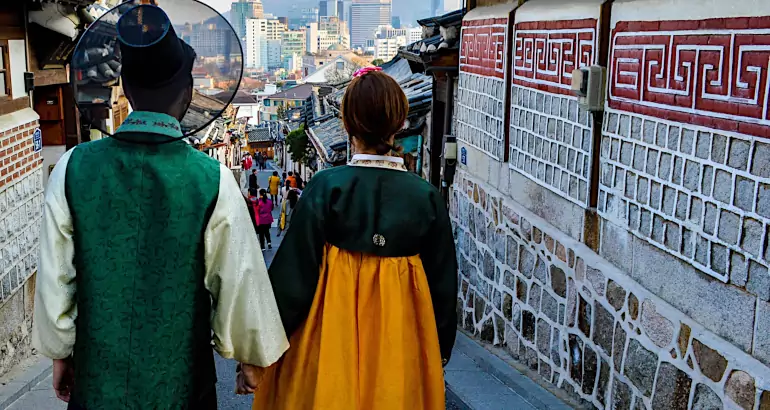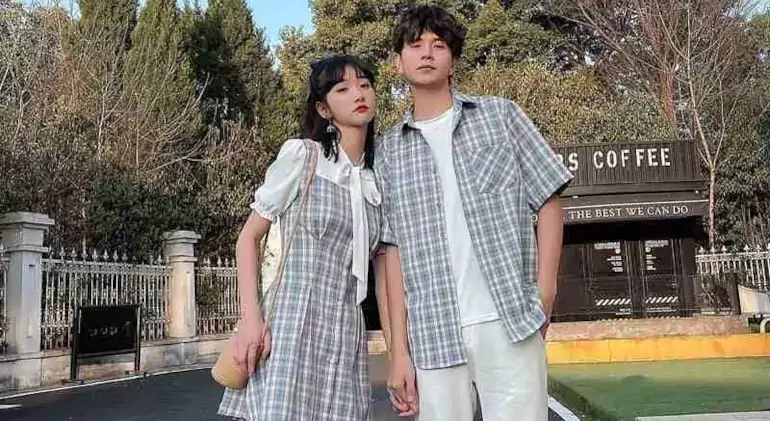Customs and Traditions: A Guide to Good Manners in South Korea

Borane is French, but her parents are from South Korea. We've had a conversation with her, and she shared some insights into the customs of South Korea. You'll find that some of them are quite surprising!
Confucianism
Korea was influenced by China for over two thousand years. Therefore, it's no wonder that Confucianism, a philosophy originating in feudal China, has played a pivotal role in shaping Korean society, influencing its values, family dynamics, and social interactions. Benevolence, righteousness, decorum, wisdom, and responsibility are the five fundamental Confucian virtues. With this understanding, you can begin to grasp the customs and social fabric of South Korea.
Celebrations
Jesa is akin to All Saints' Day. In Korean culture, ancestors hold significant importance. It's believed that when a family member passes away, they remain with the family for four generations, overseeing and protecting them. Ancestor worship isn't confined to a single day; traditionally, it involves a series of four rituals.
Gijesa (기제사): This marks the anniversary of a family member's passing.
Charye (차례): Held twice a year during Seollal and Chuseok, this ceremony pays tribute to ancestors. Chuseok, known as the "Harvest Festival," typically falls in September, when families gather at their ancestors' graves. It's a major traditional event, where Koreans don the elegant Hanbok attire. Seolnal, the Lunar New Year, brings South Koreans together to honor their ancestors and enjoy precious moments with family.
Sije (시제): Observed in the tenth month of the Lunar calendar, this ceremony takes place at the graves of ancestors from the fifth generation or earlier.
Myoje (묘제): A ritual held at the graves of ancestors from the fourth generation.
Kimjang or Gimjang, held in late autumn, is a cherished tradition involving the mass preparation of kimchi. Communities join forces to ensure every household has enough kimchi reserves for winter, fostering stronger family and community ties. This festival is recognized as UNESCO Intangible Cultural Heritage of Humanity.
Customs and good manners in South Korea
South Korea values respect, especially for elders, as a cornerstone of its society. It's essential to adapt your expressions and behavior based on the age of the person you're interacting with. Therefore, it's common for people to inquire about your age early on, as it helps determine the appropriate level of respect and rapport.
In Korean culture, younger individuals are expected to demonstrate respect towards their elders by following specific codes of conduct. This expectation extends to interactions with individuals of higher rank in the workplace.
Below, we offer a guide to "dos and don'ts" in South Korea to navigate social interactions smoothly and avoid misunderstandings.
- When offering or receiving something from an elder, it's customary to use both hands as a sign of respect.
- When greeting, a slight bow of the head is generally appropriate. To show even greater respect to an elder or your boss, standing up while greeting them is considered polite.
- At the dining table, wait to be directed to your seat. Tradition dictates that the eldest person leads the table and initiates eating. It's also common for them to handle the bill, so it's natural for them to start! Additionally, before each meal, it's customary to say a phrase equivalent to "Enjoy your meal!" (잘 먹겠습니다 – Chal mokesubnida). This translates to "I will eat well" and is a way of expressing gratitude to the person who prepared the food.
- While eating, avoid lifting your plate off the table and reach for dishes to taste the food.
- Never insert your chopsticks upright into a bowl of rice, as it resembles incense used at funerals.
- When drinking Soju with a Korean, it's important to keep an eye on their glass. If it's empty, promptly offer to refill it.
- If an elder offers you a drink, it's considered impolite to refuse. As mentioned earlier, when being served, it's respectful to hold the glass with both hands.
- Furthermore, when invited to someone's home, it's essential to remove your shoes before entering. They may offer you indoor slippers for added comfort.

Travel Tips
Even if you're just going on vacation, it's important to respect certain traditions and customs in South Korea:
- When you're on a bus or train, seats for old people are just for them. Even if there's lots of space, don't sit there.
- Be careful how loud you talk! In Korea, loud noises bother people. If you talk too loud, someone might tell you to be quiet.
- Like in Japan, blowing your nose in public is impolite.
- People in Korea don't like getting tips. If you leave one, it might make them feel like they did something wrong when they set the price.
- When you meet a South Korean, just shake hands. They don't like kisses or hugs!
Glossary
- "Hello": "An-nyeong ha-se-yo" (ahn-nyeong hah-say-yo)
- "Thank you": "Gam-sa-hab-ni-da" (gahm-sah-hahm-nee-dah)
- "How are you?": "Jal ji-nae-syeoss-eo-yo?" (jahl jee-nay-she-oss-uh-yo?)
- "I'm fine, thank you": "Jal ji-naess-eo-yo" (jahl jee-nass-uh-yo)
- "Excuse me": "Joe-song-hab-ni-da" (joh-seong-hahb-nee-dah)
- "How do I get to…?": "E eo-ddeoh-ge ga-yo?" (eh uh-doh-geh gah-yo?)
- "The check, please": "Gye-san-seo ju-se-yo!" (gyeh-sahn-suh joo-suh-yo!)
- "Goodbye" (to someone leaving): "An-nyeong-hi ga-se-yo" (ahn-nyeong-hee gah-say-yo) ("Go in peace")
- "Goodbye" (to someone staying): "An-nyeong-hi gye-se-yo" (ahn-nyeong-hee gye-say-yo) ("Stay in peace")
If you love South Korean culture, remember that since 2019, it's possible to go on a Working Holiday Visa to South Korea.
Travel Insurance for South Korea
If you're going to South Korea, make sure to get travel insurance. Medical care there is good but costly for foreigners. That's why the Ministry of Foreign Affairs suggests having good medical insurance before going to Korea.
If you're going to South Korea for less than three months, our Cap Assistance plan is a good choice. It covers up to €300,000 for medical costs without any deductible.
If you're staying in South Korea as a tourist for more than three months, you should get Cap Adventure insurance. It covers up to €200,000 with no deductible.
 The Challenge of never having experienced a romantic relationship in South Korea
The Challenge of never having experienced a romantic relationship in South Korea Love in South Korea: Exploring Relationships and Dating Culture
Love in South Korea: Exploring Relationships and Dating Culture Quiz: Would You Be a Loser in South Korea?
Quiz: Would You Be a Loser in South Korea? Love in South Korea: Part 2 - Getting to Know Each Other
Love in South Korea: Part 2 - Getting to Know Each Other K-POP: The Iconic Music of the Korean Culture
K-POP: The Iconic Music of the Korean Culture Discovering South Korea: 8 Fascinating Tips for Your Journey
Discovering South Korea: 8 Fascinating Tips for Your Journey
Leave a Reply